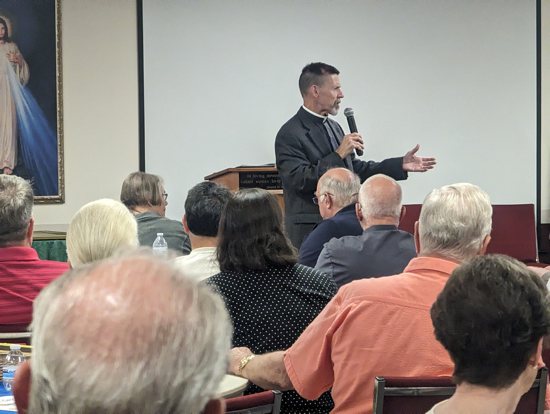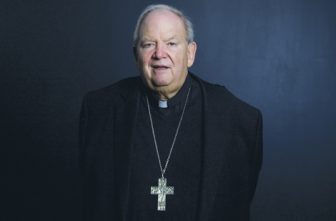
It’s not a program, but it provides structure. It invites people in parishes to come together in natural, faith-filled, friendly formats. And it has the potential to bring Christ’s love more powerfully into a confused and divided world.
That’s the promise and the hope offered by those who are working to help implement year one of Archbishop Bernard Hebda’s pastoral vision for the Archdiocese of St. Paul and Minneapolis.
Spurred by three years of preparation, prayer and listening to parishioners that culminated in a June 2022 Archdiocesan Synod, and propelled by months of careful planning, year one began in July. Activity is growing visibly this fall, with about 72 people and still more in each of the archdiocese’s nearly 200 parishes participating. For seven weeks, they will dive into ways of leading small groups that can foster personal relationships grounded in Christ. They will serve as catalysts for sharing the good news, said Deacon Joseph Michalak, director of the Office of Synod Evangelization.
WHAT HAPPENS NOW
- September into November: Small group leader formation
- Nov. 11-Dec. 10: Parishes offer a small group practical training session
- January 2024: Parishes pilot small groups under the Parish Evangelization Cell System
- January to early February: Parishioners urged to join small groups starting in Lent 2024.
- Ash Wednesday, Feb. 14 or sooner: Small groups available to all in parish
How will this happen?
“Come and see,” Deacon Michalak urged parish leaders in a video explaining the process, referencing Philip in the Gospel of John inviting a doubting Nathanael to meet Christ.
“Brothers and sisters, we’re running together,” Deacon Michalak said in the video. “My prayer is that together we would see him (Christ) and in love, invite others to come and see as well.”
The invitation and living it out through the model being proposed makes a difference in people’s lives, Deacon Michalak said in an interview. “This way of being parish and reaching out to others is proving to be a concrete answer to the loneliness that we can experience, even in our parishes. And certainly, beyond the parish. It’s a world hungering for relationships.”
Bob Nicholas — a member of Mary, Mother of the Church in Burnsville and a volunteer leader for that parish’s implementation of the Synod — said Archbishop Hebda’s November 2022 post-synodal pastoral letter, “You Will Be My Witnesses: Gathered and Sent From the Upper Room,” makes it clear that everyone has a role in sharing Christ’s promise of salvation. It goes well beyond pastors and parish staff, he said.
“We’re not staff evangelizers,” he said. “Small groups build our parish around a community. Small groups are a way to live as the Church.”
COMPONENTS OF PECS
Seven key elements in the small group model under the Parish Evangelization Cell System. Each meeting lasts 90 minutes.
- Praising God with songs and prayers
- Sharing recent experiences of God and our response to him.
- Teaching element; content depends on focus of group
- Discussing the teaching
- Parish announcements
- Intercessory prayer for people in and outside the group
- Healing, prayer ministry within the group
More than 80 parishioners are signed up at Mary, Mother of the Church. More are expected as the parish prepares for an Oct. 2 start to small group formation training, using videos and other materials developed by the archdiocese, Nicholas said. “The harvest is abundant and there is still wheat in the field. We want to keep inviting people.”
Matt Belford — confirmation coordinator, youth ministry, OCIA, baptism and adult faith formation leader at St. Joseph in Miesville — said his parish has teamed with St. Pius V in Cannon Falls to offer the formation for small groups, which is called Parish Evangelization Cell Systems, or PECS.
About 20 people from the rural parishes attended the first session Sept. 19 at St. Pius V, Belford said. “For our size parish, I was pretty pleased,” he said.
One accommodation for those who travel from their farms or nearby towns has been to lengthen the sessions but shrink the number of weeks involved from seven to four, Belford said.
Nadine Friederichs, director of mission at All Saints in Lakeville, said even as the parish’s 12 leaders reached out to at least 72 people, the number interested grew to 110. Three separate sessions of the same teaching are being offered each week. About 25 people attended the first one Saturday, Sept. 16, and about 60 people showed up at a gathering on the same lesson offered on Tuesday evening, Sept. 19, she said.
“I think our team had a good praying and discerning session to reach out to people who have certain pastoral charisms,” Friederichs said, such as hospitality and caretaking. That helped the team reach people who might feel called to take part, she said.
Part of preparation for the 12 parish leaders in each parish was a nearly three-month missionary discipleship formation program capped by a one-day Activated Disciple Seminar May 20 that drew more than 1,500 people to Williams Arena in Minneapolis for Mass, prayer and personal testimonies. Friederichs said she attended and was inspired by one phrase in particular, “holy boldness.” It’s now the theme for All Saints in implementing the Archdiocesan Synod, she said.
“Each of us took bold action to invite people at Masses or among our acquaintances,” she said. “We’re excited that it’s been received so well. We’re trying to keep that energy and the Holy Spirit flowing through them. And have faith that our bishops are leading us through.”
Explaining the process in another preparatory video, Bishop Joseph Williams said some Catholics shy away from the word “evangelization” because it seems imposing. The approach encouraged by Archbishop Hebda through PECS recognizes people’s natural gifts and is easily implemented and adaptable, Bishop Williams said.
“We’re teaching people a way of relational ministry that keeps them within their giftedness,” Bishop Williams said. “The small group is not an end in itself. It is a way, a path of missionary discipleship.”
“These small groups teach people within them a very concrete and intentional path of missionary discipleship,” the bishop said. “How to invite their friends, their neighbors, their coworkers, into a relationship with Jesus Christ, into which the small group can be an instrument that includes prayer, service, sharing our testimony.”
Deacon Michalak explained further in a video:
“Notice that name, ‘evangelizing cell.’ It connotes a cell that grows and multiplies, and it is evangelistic. It’s oriented to gently exposing people to the good news of Jesus Christ, the savior. It is evangelistic, not by knocking on doors, preaching on the street corners like that brave, lonely guy outside Target Field, or handing out flyers, all of which may have their place,” Deacon MIchalak said. “But it is evangelistic, telling the good news, naturally, organically, relationally, through natural relationships in our lives, through family, friends, neighbors, coworkers, fellow Vikings fans in our circle, even fellow parishioners.”
Father James Perkl, pastor of Mary, Mother of the Church, said Archbishop Hebda’s pastoral letter and efforts to implement it already have made a difference in parish council and other meetings.
“Last night, our parish council was praying for each other, for everybody in our lives,” Father Perkl said. “We’ve come a long way. This isn’t just a business meeting. Already the pastoral letter has made a difference in how we meet and what we pay attention to.”
“Now we have a growing family of faith that is led by the Holy Spirit,” Father Perkl said. “It really feels different.”
THREE FOCUS AREAS
Archbishop Bernard Hebda discerned three focus areas for pastoral life in the Archdiocese of St. Paul and Minneapolis.
- Forming parishes that are in the service of evangelization
- Forming missionary disciples who know Jesus’ love and respond to his call
- Forming youth and young adults in and for a Church that is always young
More than 500 people at the Archdiocesan Synod in June 2022 voted on priorities to begin implementing Archbishop Hebda’s pastoral vision. The archbishop studied, prayed and discerned three for the next three years:
- (July 2023-June 2024) Parish-based small group formation
- (July 2024-June 2025) The Mass and the Eucharist
- (July 2025-June 2026) Parents as primary educators of their children in ways of faith.



